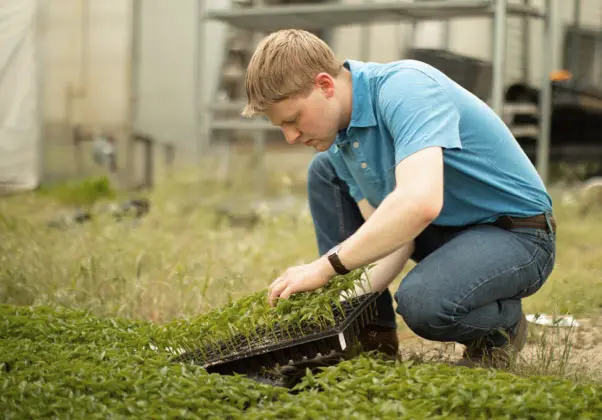Technical Systems Pathway
Technical Systems Pathway
Does your student dream of moving to the country, but can’t give up their devices? Or maybe they’re looking to stay in their rural community but intrigued by careers in technology? Good news: They don’t have to choose between a rural, farming lifestyle and a career in technology!
Agriculture has gone high-tech. Farmers and ranchers are using satellite imagery, drones, GPS technology, and data science to plant the right crops at the right time in the right place. They’re using technology to optimize irrigation and apply just the right amount of pesticides, herbicides, and fertilizer. That translates into less waste and pollution; higher farm income; and more abundant, healthier, cheaper food for more people.
There are a variety of jobs for those who want to get involved: agricultural engineer (designs systems and equipment to improve livestock health and increase crop yields), agricultural mechanic (repairs farm machinery), precision agriculture technician (studies data to advise farmers on optimizing farm operations), and more.
Gain real-world skills through project-based learning.
For those who choose the Technical Systems Pathway, Stride Career Prep* offers a rigorous, project-based learning curriculum designed to hone their problem-solving, communication, critical thinking, and team collaboration skills. This curriculum is taught by experienced agricultural science professionals and includes agricultural science and agricultural mechanics courses.
How does mental health affect students?
Students’ mental health during online learning can be both positively and negatively affected by various factors. The mental health of students can affect their education, social life, and emotional well-being. Students struggling with mental health may experience more significant challenges throughout school and adulthood, while those not struggling may have a greater zest for their education, social experiences, and more.
CAREER EXPLORATION COURSES
These courses provide an opportunity for students to gain insight into potential careers.
CAREER FOUNDATION COURSES
These courses are building blocks that prepare students for more specialized pathway courses.
CAREER PREPARATION COURSES
These courses prepare students for industry-recognized certification exams.
OPTIONAL CAREER LEARNING COURSES
While not required, these courses provide an opportunity for students to gain knowledge and skills that are useful in their chosen careers.
Agriculture Explorations
OR
Agriscience 1
Principles of Agriculture, Food & Natural Resources
General Agriscience 2
Green Design and Technology
Agricultural Mechanics 1
Agricultural Mechanics 2
Agricultural Mechanics 3
Intro to Advanced Manufacturing
Computer and Cloud Fundamentals††
A+ Computer Management with Exam Prep 1†
A+ Computer Management with Exam Prep 2†
Note: Pathway courses are subject to change.
†New in fall 2022
††New in spring 2023
Get credentialed.
In a world where competition for jobs, pay increases, and academic success continues to increase, certifications provide a credible, third-party assessment of a student’s skills and knowledge of a given subject. Students in this pathway can prepare to take these industry-recognized certification exams:**
EMPLOYMENT READY CERTIFICATIONS
These certifications indicate students have acquired skills needed to perform a job with little or no support.
CompTIA A+
Get ahead of the competition.
We encourage students to jumpstart the job search by helping them create a professional résumé, cover letter, and profile on Tallo, the leading professional networking platform for Gen Z. Plus, they connect virtually to working business professionals and entrepreneurs through Nepris.***
Find a school near you that offers the technical systems pathway.
Stride Career Prep programs with the Technical Systems Pathway are available at tuition-free K12-powered, public online schools in the following states:
Don’t see your state? Check out the tuition-based option here in the Technical Systems Pathway. There are also tuition-free options in related fields like the Food Processing & Production Pathway!
Choose a career. Prepare for the future.
Students in this pathway can prepare for a wide variety of careers, including:
Water and wastewater treatment plant and system operators control an entire process or system of machines to transfer or treat water or wastewater, often using control boards.
2021 Median Salary
$52,320
Expected Job Growth Rate for 2020–2030
Average
Typical Entry-Level Education
High school diploma or equivalent
This data reflects the information available from the Bureau of Labor Statistics, U.S. Department of Labor, Occupational Outlook Handbook on July 1, 2022. To learn more about this occupation, visit bls.gov/oes/current/oes518031.htm.
Heavy vehicle and mobile equipment service technicians inspect, maintain, and repair vehicles and machinery used in construction, farming, and other industries. Service technicians usually work indoors in noisy repair shops. They often lift heavy parts and tools, handle greasy and dirty equipment, and stand or lie in uncomfortable positions. Most service technicians work full time, and many work evenings and weekends.
2021 Median Salary
$53,770
Expected Job Growth Rate for 2020–2030
Faster than average
Typical Entry-Level Education
High school diploma or equivalent
This data reflects the information available from the Bureau of Labor Statistics, U.S. Department of Labor, Occupational Outlook Handbook on July 1, 2022. To learn more about this occupation, visit bls.gov/ooh/installation-maintenance-and-repair/heavy-vehicle-and-mobile-equipment-service-technicians.htm.
Environmental science and protection technicians monitor the environment and investigate sources of pollution and contamination, including those affecting public health. This is a broad profession with many subspecialties. Some environmental science and protection technicians may work for environmental nonprofits or state or local governments, taking water and soil samples to test for contamination. Others might work for industrial or manufacturing workplaces ensuring workers are not exposed to dangerous levels of chemicals or radiation. Still, others might consult for construction or other companies, planning or cleaning contaminated sites or limiting negative environmental impacts from construction.
2021 Median Salary
$47,370
Expected Job Growth Rate for 2020–2030
Faster than average
Typical Entry-Level Education
Associate’s degree
This data reflects the information available from the Bureau of Labor Statistics, U.S. Department of Labor, Occupational Outlook Handbook on July 1, 2022. To learn more about this occupation, visit bls.gov/ooh/life-physical-and-social-science/environmental-science-and-protection-technicians.htm.
FAQs
You can prepare for a career as an agricultural mechanic while still in high school by taking vo-tech classes that allow you to really get under the hood of large vehicles. Many brick-and-mortar vo-tech high schools offer courses in auto mechanics, and there is a significant overlap between auto mechanics and agricultural mechanics. Great preparation, of course, is to take classes in agricultural vehicle mechanics. That’s why our tuition-free Technical Systems pathway includes three courses in agricultural mechanics.
Precision agriculture uses technology, such as GPS and drones, to apply water, fertilizer, pesticides, herbicides, and other agricultural inputs in a more targeted, effective, and efficient manner. The goal is to reduce costs and negative environmental impacts while driving agricultural productivity.
No. You don’t necessarily need a college degree to get a job in environmental science. You will need a bachelor’s degree to become an environmental scientist. Environmental scientists design and lead studies to identify and measure hazards to ecosystems and human health, design or oversee projects to reclaim contaminated lands or waterways, or make recommendations to minimize the environmental impact of construction projects. However, large teams of environmental science technicians often support environmental scientists—and these professionals do not necessarily need a college degree. Environmental science technicians perform the vital work that makes these studies possible. They collect water, air, and soil samples; analyze them in a laboratory; and prepare the results in charts and graphs. Alternatively, they may work on construction sites implementing environmental protection measures or in industrial workplaces, ensuring compliance with environmental and worker safety requirements. Most environmental science technicians have two-year associate’s degrees from a community college, but some have only a high school diploma and significant on-the-job training.
*Stride Career Prep is a program for grades 9–12. Some schools offer career exploration in middle school.
**Many Microsoft®️ Office certificates can be earned after completing one course. Other certificates require more classes to be better prepared, and students who participate in the program for at least two years will have further preparation for certification testing.
***Opportunities vary by school; please visit your school page or check with your school counselor.















